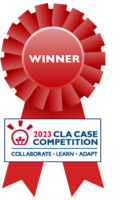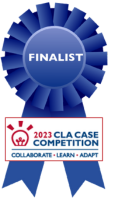
2024 CLA Case Competition
Important Dates
Coming Soon! The 2024 CLA Case Competition
The Bureau for Planning, Learning, and Resource Management (PLR) is delighted to announce that the 2024 CLA Case Competition—a celebration of ten years of continuous learning for improved development outcomes—is opening soon!
The CLA Case Competition is about capturing real-world examples from USAID staff and Agency partners of strategic collaboration, continuous learning, and adaptive management in action. To that end, this friendly competition has, over the past decade, grown the CLA case library on Learning Lab to over 600 cases. These CLA Case Competition cases inform USAID and partner work in advancing how CLA approaches can be applied for organizational learning and improved development results.
Participation in this year's milestone competition is open to all individuals and organizations working with USAID. As you start reflecting with your teams and writing your cases, consider the following:
- Does your team pause and reflect on your activities?
- Are you creating a learning culture within your organization, perhaps by fostering diversity, equity, inclusion, and accessibility (DEIA)?
- Have you adapted activity implementation based on evaluation findings for performance monitoring information?
- Are you using CLA approaches to tackle challenges related to the Agency Learning Agenda?
Remember, the CLA Case Competition is not a call for traditional success stories; we want to hear what’s working well, what you’re struggling with, and what you’ve learned along the way. It can be about something big, or about one small practice that made an important difference to your work. Ultimately, your CLA case should showcase your team’s innovation and expertise, and in that way, help us all move the needle on strategic collaboration, continuous learning, and adaptive management.
Revisit this page for updates on the 2024 CLA Case Competition, and be sure to subscribe to the Learning Matters newsletter, and follow us on X and LinkedIn. Of course, as you think about your cases, take inspiration from our CLA Case Library, which has excellent submissions from ten years of CLA Case Competitions!
>>> Browse our CLA Case Competition Case Library
Learn More About CLA
What is Collaborating, Learning, and Adapting (CLA)?
In 2012, USAID’s Bureau for Planning, Learning, and Resource Management (PLR) introduced the concept of collaborating, learning, and adapting as the Agency’s approach to organizational learning and adaptive management throughout USAID’s Program Cycle. Collaborating, Learning, and Adapting (CLA) is intended to help USAID and its partners address common challenges that pervade international development assistance, including when:
- Coordination among donors and implementers is lacking, resulting in missed opportunities for greater impact
- Development is donor-driven, rather than country-led or community-owned
- Data and evidence that could inform programming are not utilized
- Outdated practices are still used despite evidence of their ineffectiveness
- Programming is not relevant to the local context
- Donors and implementing partners stick to existing plans and implementation approaches even as the context changes
As development practitioners, USAID staff and implementing partners do their best to avoid these common pitfalls. However, significant demands on time, limited resources, and a need to show immediate results often means that collaborating, learning, and adapting effectively to overcome these challenges remains elusive.
In the simplest terms, integrating collaborating, learning, and adapting throughout the Program Cycle can help development practitioners address the above challenges by thinking through:
- Collaborating: Are we collaborating with the right partners at the right time to promote synergy over stovepiping?
- Learning: Are we asking the most important questions and finding answers that are relevant to decision making?
- Adapting: Are we using the information that we gather through collaboration and learning activities to make better decisions and make adjustments as necessary?
- Enabling Conditions: Are we working in an organizational environment that supports our collaborating, learning, and adapting efforts?
The CLA Framework
While collaborating, learning, and adapting are not new to USAID or international development in general, they often do not happen regularly or systematically and are not intentionally resourced. To address this, USAID's Collaborating, Learning, and Adapting (CLA) Framework helps USAID missions and implementing partners think more deliberately about how to plan for and implement CLA approaches that fit their context and assist them in achieving their development objectives.
Graphic: CLA Framework supports implementation of USAID's Program Cycle.
The CLA Framework identifies components and subcomponents to help USAID staff and partners think more deliberately about what approach to CLA might be best tailored to an organizational or programming context. The framework recognizes the diversity of what CLA can look like in various organizations and projects while also giving CLA structure, clarity, and coherence across two key dimensions:
- CLA in the Program Cycle (portion shaded in red on the left-hand side of the CLA Framework above): how CLA is incorporated throughout Program Cycle processes, including strategy, project, and activity design and implementation; and
- Enabling Conditions (portion shaded in dark blue on the right-hand side of the CLA framework above): how an organization’s culture, business processes, and resource allocation support CLA integration.
Organizations need both integrated CLA practices appropriate for their context and conducive enabling conditions to become stronger learning organizations capable of managing adaptively. The framework stresses the holistic and integrated nature of the various components of CLA to reinforce the principle that CLA is not a separate workstream—it should be integrated into existing processes to strengthen the discipline of development and improve aid effectiveness.
View the CLA Framework two-pager to learn more about what each of the subcomponents mean.
Want to learn more about CLA? Check out these resources in the CLA Toolkit.
2023 CLA Case Competition Winners and Finalists!
The 2023 CLA Case Competition submission period lasted from May 15 to June 15, during which 154 cases were received.
A team of judges from USAID read all entries and selected a short list for review by a second panel of judges. Out of the 154 submissions, the judges identified nine winners and twelve finalists.
See the finalists and winners in alphabetical order below.

2023 CLA Case Competition Winners:
Ask Questions, Generate Learning, Use Learning (Wash, Rinse, Repeat) | USAID/Somalia
USAID/Mexico Unlocks the Door for More Innovative MEL Approaches | USAID/Mexico
A Cultural Shift in Using Data to Improve Child Outcomes in Moldova | USAID/Moldova
EpiC Vietnam Transforms Team Dynamics Using CLA | FHI 360
CLA and Research to Change With Adolescents in Zambia | Grassroot Soccer Zambia (GRSZ)
Driving Results and Local Ownership With Systems-Based CLA in Colombia | Chemonics International, Inc.
Re-Scoping a Project While Maintaining Its Core Objective | RTI International
An International Collaborating, Learning, and Adapting Case Competition | USAID MOMENTUM Routine Immunization
The Power of Collaboration and Experiential Learning–Transforming Skeptics Into Champions in Jamaica | USAID/Jamaica

2023 CLA Case Competition Finalists:
A Data-Driven Project to Data-Driven Utilities | Engicon
Adaptive Program Design Through Community Visioning in Zimbabwe | CARE International
Beyond Funding: USAID/Liberia’s Ongoing Journey for Inclusive Local Partnerships | USAID/Liberia
Community Visioning as an Effective Approach to Localization | USAID/Zimbabwe
Collaboration in Wartime: Delivering Generators to Hospitals in Ukraine | USAID Energy Security Project and USAID Health Reform Support Project
Evidence Cycle and the Annual RFS Pause and Reflect | USAID/RFS/ALD
Livin’ La Vida DOJO: Improving Learning Practices at Scale | USAID/Vietnam, Social Impact, ASU, HAIVN
Locally Led Developmental Evaluation Improves CLA Practices in Ethiopia | Headlight Consulting Services LLC
Measuring the Benefits of USAID Integrated Programming in the DRC: A Participatory Modeling Approach | USAID/DRC, SoCha LLC
Pausing and Reflecting Pays Dividends for Nascent Ethiopian CSOs | CEPPS
Tracking Allegations of Sexual Exploitation and Abuse BPR | USAID/M/MPBP
USAID/Peru’s Adaptive Management in Rapidly Shifting Contexts | USAID/Peru, EnCompass LLC
